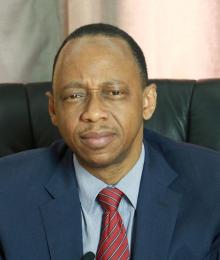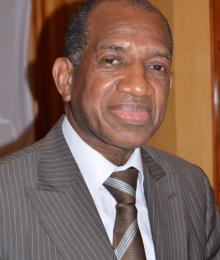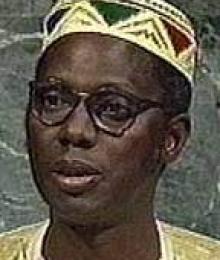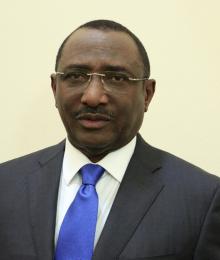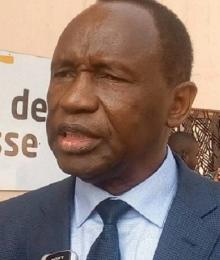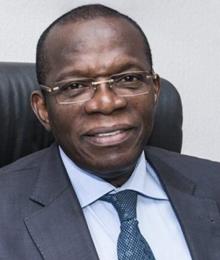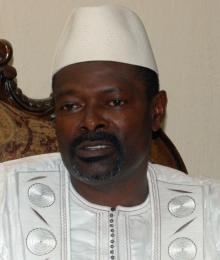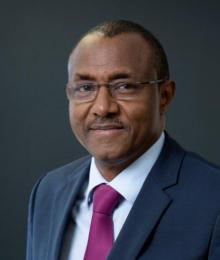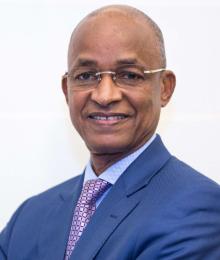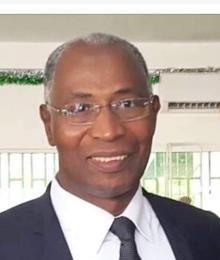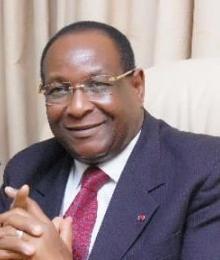
Lansana Kouyaté, born on July 15, 1950, is a distinguished Guinean politician and diplomat who has made significant contributions to his nation and the broader West African region.
His notable achievements include serving as the Prime Minister of Guinea from 2007 to 2008 and holding the position of Executive Secretary of the Economic Community of West African States (ECOWAS) from 1997 to 2002.
These roles have solidified his reputation as a visionary leader dedicated to fostering regional cooperation and advancing the interests of his country.
Introduction
In the realm of Guinean politics, few individuals have left as indelible a mark as Lansana Kouyaté. Born into humble beginnings, Kouyaté ascended to become the Prime Minister of Guinea from 2007 to 2008.
His steadfast dedication to the advancement of democracy and the rule of law has solidified his position as an influential figure within Guinea and beyond.
This blog post delves into the life, education, career, international contributions, tenure as prime minister, and political and personal journey of Lansana Kouyaté.
Early Life and Career
Lansana Kouyaté was born in Koba, Guinea, a French colony at the time, and his journey towards becoming a prominent statesman began with his pursuit of education and subsequent entry into the civil service.
After studying administration at the University of Conakry, Kouyaté joined the government bureaucracy. In 1976, he assumed the position of Director of Labour, and the following year, he transitioned to become the Director of Trade, Prices, and Statistics, where he oversaw state-owned companies.
In 1982, Kouyaté shifted his focus to a rice development project before joining Guinea's diplomatic service. He became a member of Guinea's delegation in Cote d'Ivoire, representing his country's interests.
In 1985, he returned to Conakry's Foreign Ministry as the head of African and Organisation of African Unity affairs. Two years later, Kouyaté was appointed as Guinea's ambassador to Egypt, Jordan, Lebanon, Sudan, Syria, and Turkey. His diplomatic acumen and dedication to fostering international relations became evident during his tenure.
In 1992, Kouyaté assumed the role of Guinea's Permanent Representative to the United Nations. He subsequently became the Vice President of the United Nations Economic and Social Council, leveraging his position to advocate for Africa's interests on the global stage.
In 1993, he took on the role of Deputy Special Representative of the Secretary-General in Somalia for the UNOSOM II mission. By February 1994, he had become the Acting Representative, demonstrating his leadership skills and ability to navigate complex political environments.
Kouyaté's career trajectory continued to ascend when he became the Assistant Secretary-General in the UN Department of Political Affairs in June 1994. During this time, he undertook crucial missions, including a tour of ECOWAS member states to address the situation in Liberia.
He played a vital role in fostering regional cooperation and support to resolve the First Liberian Civil War. In September 1997, he left the United Nations to assume the position of Executive Secretary of the Economic Community of West African States (ECOWAS), a significant regional organization. Kouyaté held this post until February 2002, leaving a lasting impact on regional integration and development efforts.
Throughout his distinguished career, Lansana Kouyaté has been recognized for his exceptional contributions. He received the Legion d'Honneur (Commander) and the African Star of Liberia, as well as being appointed a Commander of the Mono Order of Togo.
These honors reflect his significant achievements and commitment to regional diplomacy and socio-economic progress within West Africa.
Prime Minister
Following a general strike in early 2007, Lansana Kouyaté emerged as a significant figure in Guinea's political landscape. On February 26, 2007, he was nominated for the position of Prime Minister in response to the strike.
President Lansana Conté selected him from a list provided by trade union leaders, recognizing Kouyaté's credibility and ability to address the concerns of the striking workers. On March 1, 2007, Kouyaté was sworn in as Prime Minister in a ceremony in Conakry, although President Conté was absent.
Kouyaté formed a new government on March 28, 2007, comprising 19 ministers and three secretaries of state. Notably, none of the members of the previous government were included in this new cabinet, indicating a desire for change and a break from past practices.
However, tensions soon arose between Kouyaté and President Conté. On December 5, 2007, a decree was issued that restructured ministries, granting increased powers to the Secretary-General of the Presidency at the expense of the Prime Minister's authority.
This move weakened Kouyaté's position and strained his relationship with Conté. In another instance of disregard for Kouyaté's authority, Conté dismissed and replaced Justin Morel Junior, the Minister of Communication and Government Spokesman, on January 3, 2008, without consulting Kouyaté.
In response to Morel's dismissal, Kouyaté took a firm stance and demanded that Morel be reinstated to his position. He refused to attend the Council of Ministers with Morel's replacement.
Labor unions, aligned with Kouyaté, announced plans for a new "unlimited general strike" starting on January 10, 2008, with the goal of ensuring the proper implementation of Conté's agreements with the unions and the restoration of Morel.
However, Kouyaté's government chose to pursue a diplomatic approach, engaging in dialogue with Conté to defuse the situation and maintain peace. As a result, on January 9, 2008, the unions withdrew their call for a strike.
Tensions further escalated between Kouyaté and Conté due to disagreements over Kouyaté's decision to repatriate Chantal Cole, Conté's advisor responsible for communications at the presidential palace, back to France.
Additionally, the two leaders had differing views on Kouyaté's choice to allow Libyans to manage luxury hotels in Guinea. These tensions strained the relationship between Kouyaté and Conté, highlighting the challenges faced by Kouyaté in asserting his authority and implementing his vision for Guinea's governance.
Dismissal from Prime minister
The political landscape in Guinea took an unexpected turn on May 20, 2008, when President Lansana Conté dismissed Lansana Kouyaté from his position as Prime Minister and appointed Ahmed Tidiane Souaré as his replacement. This decision came as a surprise, as it was widely believed that Kouyaté would remain in office until the scheduled parliamentary elections in December 2008.
The news of Kouyaté's dismissal was announced through a decree broadcasted on state television. The abrupt removal of Kouyaté from his post triggered protests in several cities, including Conakry, Kouroussa, and Kankan. Demonstrators voiced their discontent with the decision, reflecting their support for Kouyaté and their dissatisfaction with the sudden change in leadership.
Despite the initial protests, reports indicated that the situation calmed down in Conakry and Kouroussa by May 21. However, protests continued in Kankan on May 20 and 21, indicating the extent of public unrest and frustration over Kouyaté's removal.
The dismissal of Lansana Kouyaté marked a significant shift in Guinea's political dynamics, leaving many citizens questioning the motivations behind President Conté's decision. The incident further highlighted the volatile nature of Guinea's political landscape and the underlying tensions within the country.
The aftermath of Kouyaté's dismissal set the stage for a new chapter in Guinea's political history, paving the way for discussions on the country's future direction and the upcoming parliamentary elections.
The protests and public reactions underscored the deep-seated desire for political stability, democratic processes, and transparent governance among the Guinean population.
Post-Prime Ministerial Activities
After his tenure as Prime Minister, Lansana Kouyaté remained an influential figure in Guinean politics. He continued to champion democratic values, advocating for free and fair elections, the protection of human rights, and the empowerment of the people.
Kouyaté played a crucial role in mediating political disputes and promoting dialogue among various political factions, striving for a peaceful and inclusive political environment.
As the leader of the Party for Hope and Development (PEDN), Kouyaté worked tirelessly to expand the party's influence and strengthen its grassroots support. He focused on mobilizing young people and empowering women, recognizing their pivotal role in shaping the future of Guinea.
Through his party, Kouyaté aimed to create a platform for diverse voices and ensure that the aspirations and concerns of all Guineans were heard and addressed.
Kouyaté's dedication to improving socio-economic conditions in Guinea remained unwavering. He advocated for equitable distribution of resources, poverty reduction, and sustainable development initiatives.
Recognizing the potential of Guinea's natural resources, he emphasized the importance of responsible resource management and attracting foreign investment to drive economic growth.
In addition to his domestic contributions, Lansana Kouyaté remained engaged in international affairs. He lent his expertise to regional and international organizations, providing counsel and support on matters of peacebuilding, conflict resolution, and democratic governance. Kouyaté's reputation as a skilled mediator and diplomat made him a sought-after figure in resolving complex political crises.
Throughout his career, Kouyaté received numerous accolades for his outstanding contributions to democracy, human rights, and peace. His unwavering commitment to the principles of justice, transparency, and accountability has left an indelible impact on the political landscape of Guinea and has inspired many aspiring leaders to follow in his footsteps.
Conclusion
Lansana Kouyaté's remarkable journey from a humble background to serving as Prime Minister of Guinea underscores his unwavering commitment to democratic principles and good governance.
Throughout his career, he has displayed exceptional leadership qualities, both within Guinea and on the international stage. Lansana Kouyaté's influence continues to shape the political landscape of Guinea, inspiring a new generation of leaders to work towards a more prosperous and democratic future for the country.











